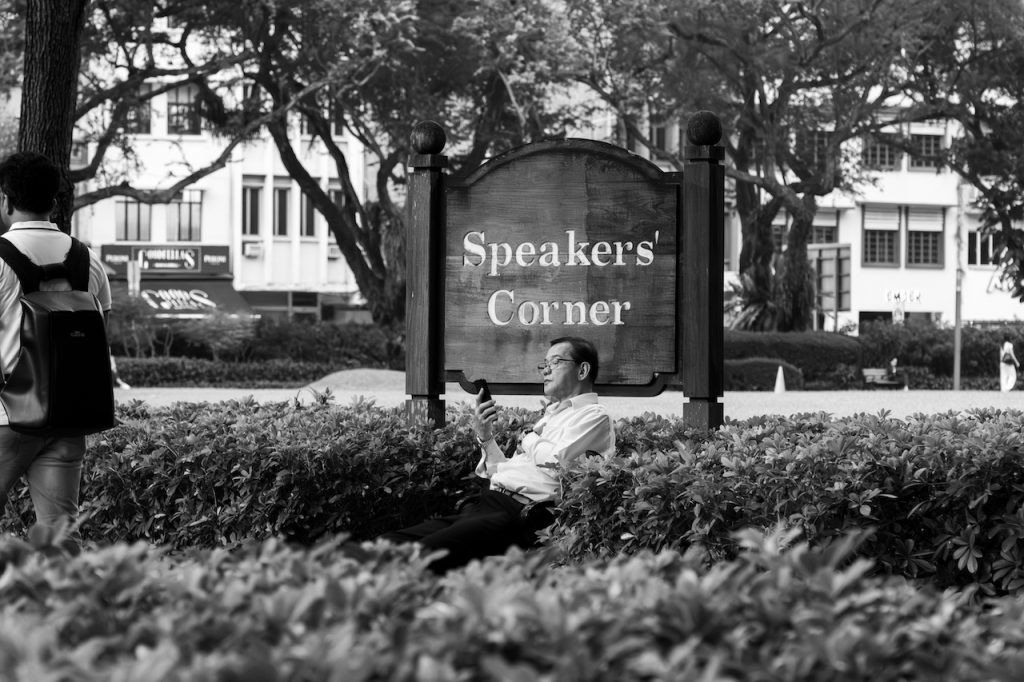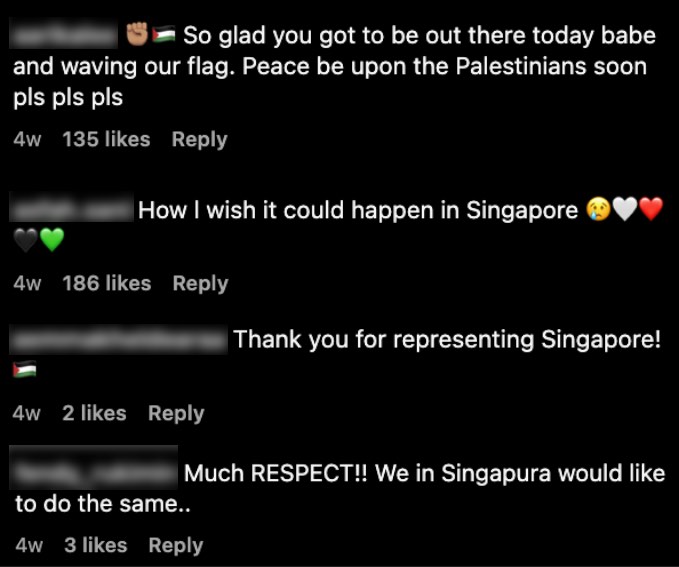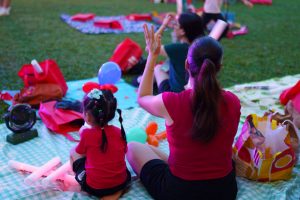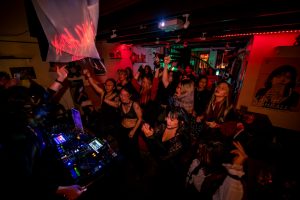Top image courtesy of Audrey Yang
The streets are a mass of green and red. “Ceasefire now!” yells the crowd as they wave Palestinian flags and signs in support of the victims in Gaza.
This particular protest is taking place in Central London. Among the crowd, there’s a familiar flag flying: Red and white with a single crescent moon and five stars.
It’s been over 100 days since Israel declared “a state of war” in reaction to a Hamas attack and launched an invasion of the Gaza Strip. At least 25,474 Palestinians and 1,139 Israelis have lost their lives. The asymmetry in casualties is evident, and Israel appeared before the International Court of Justice to answer accusations that it was committing genocide against Palestinians—an accusation Israel vehemently rejects.
With no end to the onslaught in sight, hundreds of people across the world have taken to the streets, calling for a ceasefire.
It’s a scene that’s quickly becoming a common sight on social media. Since October 2023, people in Melbourne, Seoul, Kuala Lumpur, Toronto, New York, and more have gathered in solidarity and marched. Their message is clear: “Free Palestine. Ceasefire now.”
Audrey Yang is one Singaporean who’s taken to the streets overseas to express her solidarity with Palestine. She isn’t the only one. Actress Nurul Aini recently shared on Instagram that she’d made time to attend a rally while holidaying in London. Singaporeans have also been spotted in pro-Palestine rallies in Melbourne.
Doing the same thing in Singapore would get them into trouble with the law.

Here in Singapore, public rallies about the current conflict have been disallowed due to security concerns, and we can’t publicly fly either the Israel or Palestine flag. That’s not to say we can’t talk about the issue at all.
Law and Home Affairs Minister K Shanmugam has gone on record stating that the Singapore government supports fundraising events “for humanitarian purposes”. Events such as the Singapore Palestine Film Festival that “do not promote violence or enmity against any group” are allowed. Online advocacy is also allowed, so long as it doesn’t incite violence or include hate speech against other races and religions.
But for many Singaporeans, the catharsis of holding up signs, yelling for change, and flying the Palestinian flag is something they can only experience overseas. If we’re going by online comments alone, at least, there’s a deep yearning from Singaporeans to be able to do more for the causes they believe in.

No to Rallies, Yes to Fundraisers
In the absence of protests and rallies here, advocacy and activism have taken on a more charitable face—and a lifestyle slant.
Humankind SG, which describes itself as an alternative peer support group, is selling watermelon-emblazoned merch to raise money for the Palestine Humanitarian Response. Members of the peer support group also meet regularly for activities ranging from teh tarik brewing workshops to running sessions.
Local wellness startup Moom Health pledged to donate 10 percent of all profits to Doctors Without Borders.
The Singapore Palestine Film Festival, which ran from January 12th to January 21st at indie cinema The Projector, is donating all its proceeds to the Singapore Red Cross.
Baby Boy Party, a queer party organiser, recently included a tip box at its new year’s party, promising to donate proceeds to Medical Aid for Palestinians, American Near East Refugee Aid, and feminine hygiene kits for Gaza.
Beyond raising funds for humanitarian aid, what these initiatives also accomplish is providing a space for like-minded people to get together. As much as online efforts do have an impact, I imagine it’s a different feeling getting to meet the people fighting for the same causes as you in the flesh.
Zaris Azira, 30, who came up with the idea to hold the Singapore Palestinian Film Festival, tells me that her main motivation was to give Singaporeans an outlet to express their support for the cause.
She’d previously applied to hold a rally at Hong Lim Park but was rejected. Then, she noticed that there was an Israel Film Festival held from October 20th to October 22nd. She remembers thinking: If that was allowed, then surely a Palestinian film festival would be allowed, no?
Things fell into place when The Projector was open to host the event. Erduan Sofhian Jaafar, 45, reached out to Azira to collaborate on organising the film festival, and they put a team together.
“Even if we weren’t able to protest or organise rallies, we knew Singaporeans needed some way to gather as a community to show solidarity with the Palestinians,” says Azira.
The Palestinian films screened (including feature films like Omar and short films such as Nightmare of Gaza) were also intended to showcase aspects of Palestinian life in various contexts and encourage empathy for what their people are going through.
“Palestinians are no different from us, and what they’re going through is horrific beyond words. If it were happening to us, we’d want the world to speak out as well.”
Though the film festival just kicked off, it’s already considered a success in terms of interest and attendance. Azira shares that the organising team had originally planned for 10 screenings. But due to the overwhelming interest, they ended up adding four more. All in all, an estimated 4,500 will have attended the festival. Over $50,000 has been raised so far.
With all the charity events that are happening and the positive responses to them, it’s clear that Singaporeans have a strong desire to do something about the worsening humanitarian crisis. It’s also clear that there are limits to what we can do about this sensitive matter here in Singapore.
Understandably, there’s some fear and paranoia of getting into trouble here or pissing off people who don’t share the same views. A couple of event organisers were initially keen to speak to RICE about their fundraising initiatives but eventually declined to comment due to the sensitivity of the issue.
When asked whether she’s afraid of any backlash, Azira is remarkably sanguine. While she acknowledges the potential risks, she says she “wasn’t very worried” about getting in trouble—the organising team had followed the necessary procedures and secured permissions to proceed with the film festival.
“In addition, there is really nothing illegal about organising a film festival, even if it deals with sensitive issues. I would have been more worried for Singapore if we had run into trouble.”
Taking to the (London) Streets
Most of us—at least those stuck in Singapore—wouldn’t know what attending a rally or march even feels like outside of events at Hong Lim Park.
Any protests or rallies in Singapore are confined to the Speaker’s Corner at the park and require a police permit. Over the years, we’ve seen protests on sensitive issues such as the death penalty. And in 2014, hundreds turned up to show support for the people of Gaza in an event organised by From Singapore to Palestine (FS2P).
But this time around, rallies on the Israel-Hamas conflict have been deemed too sensitive for the Speaker’s Corner. This is due to “real public safety and security concerns”, Minister of State for Home Affairs and National Development Associate Professor Faishal Ibrahim mentioned in Parliament.
While this follows the precedent set previously—no permits were approved for events relating to the Russia-Ukraine conflict—local activists were left without the opportunity to assemble peacefully and advocate for the Palestinian cause.
Sure, charity events are great, but rallies and protests are unique in how they’re able to galvanise people and push for change. So says Audrey, a Singaporean who’s been based in London for a year and has attended several pro-Palestine marches there.
At a recent march Audrey attended, over 500,000 people gathered, she says. At these events, there’s often chanting, music, and sometimes even smoke flares and fireworks. According to Audrey, they’re typically safe, organised affairs.
“It felt cathartic to be able to say things out loud, to process the grief and frustration, and to bask in hope and courage made possible by the community. It rained, and everyone just kept going. There were children, the elderly, people from the Jewish community and even dogs participating in the march.”
It was also a different experience getting to march alongside fellow Singaporeans, she says. Audrey, who’s also helped rally London-based Singaporeans to attend protests together, points out that it can be daunting to attend such events alone, especially if it’s someone’s first time.
“Having a community gives them the support that allows them to take their first step. Inviting fellow Singaporeans to walk together creates a space for us to connect, to be brave, to be hopeful and to feel less alone.”
This sense of community is also evident in the outpour of support Audrey and her fellow Singaporeans have received. When photos from their recent march were shared on Instagram (via alternative media site Wake Up Singapore), the response was one of solidarity and pride.
“Thank you for representing the people of Singapore! There’s a whole lot of us who wants [sic] freedom for Palestine,” one person wrote.
Another commented: “Thank you for being the voices of Singaporeans who care.”
If we’re going by the comments, it seems that most are aching to do more, but it almost feels like they can only live vicariously through those with the privilege to do what we can’t here.
Advocacy For Palestinians Within Limits
For those who feel strongly about the ongoing conflict, the government’s ‘friend to all’ approach might not necessarily align with their personal beliefs. But it’s long been part of Singapore’s foreign policy approach.
Vivian Balakrishnan explained in a 2017 speech: “Diplomacy is not just about having ‘friendly’ relations at all costs. It is about promoting friendly relations as a way to protect and advance our own important interests.”
The government has made it clear that its consistent position on the Israel-Hamas conflict is in our own national interests. That rationale is valid and fair.
If protests aren’t allowed, humanitarian efforts are a viable alternative. But what we really want is for the violence (across all sides) to stop. And that’s something that can only happen when there’s a stronger, firmer stance.
I ask Azira and Audrey about their thoughts on the limits Singaporeans have to live with. They express the same general sentiment: It is what it is.
Even with the current limitations on protests and rallies, they say, there are plenty of alternative ways to advocate for a cause and to speak up.
“I think as a Singaporean, it’s important to stand firm in your convictions and speak out regardless,” Azira offers. “As long as whatever you’re saying doesn’t go against the law, there should be no fear around speaking out.”
Even though an issue can be sensitive, it is possible to have mindful conversations about it, she adds.
“There are no laws against speaking about these topics, and I don’t think we should limit ourselves unnecessarily.”
Audrey, too, emphasises that protests on the streets are just one avenue for the pro-Palestine movement. There are other ways to participate, for example, buying e-Sims to help Gazans stay connected, voicing your concerns to elected leaders, participating in boycotts, and keeping Palestinian stories alive.
Constructive conversations are also important to have, she says.
“Hate speech is out of the question, of course. But there is nothing wrong with calling out violence. There is nothing illegal about asking questions. There is nothing wrong with holding powerful people accountable and calling upon them to use those powers to help.”


 (@motaz_azaiza)
(@motaz_azaiza)



